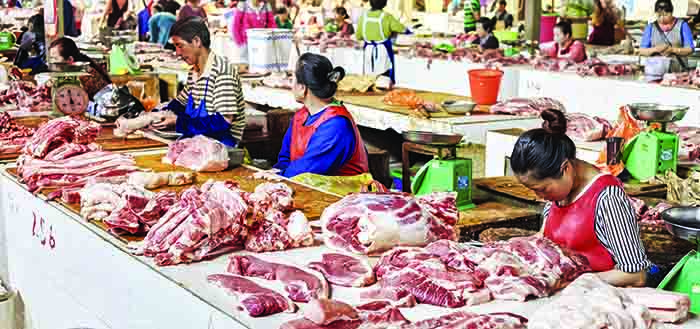The cost of living in China has outstripped the 3% government target for the first time in a decade, and a big part of the problem is the soaring price of pork, which is being driven up by a widespread outbreak of African swine fever (ASF).
The Guardian reported that some 40% of Chinese pigs – hundreds of millions of animals – have now been culled, and the result has been a chronic shortage of pork and rocketing prices. The Chinese government has been forced to dig into its gigantic emergency reserves of frozen meat.
“The producer price has risen 125% since July,” said Rupert Claxton of international food consultancy Girafood. That increase has helped drive up China’s inflation rate, which in October broke through the government target of 3% to hit 3.8%.
ASF has been circulating in Europe for a number of years, but it began to spread at a more rapid rate last year. It is now reported in more than 40 countries, and last week was discovered to have leapt 300km across Poland from its easternmost provinces to farms near its western border.
Alistair Driver, the editor of Pig World, said: “That is just 70km from the German border, and Germany is one of the largest pork exporters in the world.”
In China, and neighbouring Vietnam, the disease has spread with shocking rapidity, thanks partly to local buying habits: live pigs are regularly transported to supply the markets and butchers where most consumers buy their pork (there is still some distrust of the chilled meat in plastic packages that western consumers prefer). And despite recent government plans to modernise, the Chinese pig industry is also still dominated by small backyard farmers.
The rest of the world is waiting anxiously to see where ASF will hit next. The US is currently passing legislation to increase the number of border inspectors, while Denmark and Germany are building sturdy fences in a bid to keep out wild boar.
“In the UK it is now more a case of being prepared for it to arrive than trying to shut it out,” said Dr Zoe Davies, chief executive of the National Pig Association.
Dr Davies said she was worried about the large number of smallholders in the UK “who aren’t taking this seriously, who believe that pigs are there to recycle kitchen scraps. Just one pet pig [with the virus] and that’s the UK shut down.”




